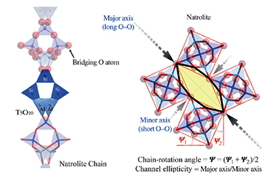Home > Press > Using pressure to swell pores, not crush them
 |
Abstract:
More than a decade ago, Thomas Vogt and Yongjae Lee, then colleagues at Brookhaven National Laboratory, uncovered a counter-intuitive property of zeolites. When they put these porous minerals in water, and then put the water under high pressure, the tiny cavities within the zeolites actually grew in size.
Using pressure to swell pores, not crush them
Columbia, SC | Posted on July 17th, 2013Pressure failed to crush, and even caused expansion. In the years since, Vogt and Lee, now at the University of South Carolina and Yonsei University (Seoul), respectively, have followed up with cation exchange experiments, placing a series of alkali metal ions into the pores of the aluminosilicate zeolites, particularly focusing on natrolite. X-ray diffraction studies, in collaboration with Chi-Chang Kao at Stanford University, have revealed the interior geometry of the cavities and the arrangement of the cations and water molecules held within, before and after pressurization.
The team has just published a detailed characterization of Li+, Na+, K+, Rb+ and Cs+ natrolites, the first four of which, when treated under pressure in water, become "super-hydrated" with water molecules - that is, the process inserts more water molecules into the zeolites than are present under ambient conditions.
The water molecules and ions together adjust the surrounding aluminosilicate framework. The team likens the shift in structure under pressure to what you see when you shift a "chatterbox," the children's fortune teller constructed from paper. The pressure-induced hydration can cause dramatic unit cell volume increases: more than a 20 percent expansion in Li-natrolite, for example.
The phenomenon is more than just an academic curiosity. The team is pursuing a number of applications in which a "tuned" cavity size that is triggered by pressure could be useful. Selectively - and irreversibly - trapping radioactive cations in a nuclear waste stream, for example, is just one area in which they've already demonstrated progress.
Lee, Kao and Vogt are supported by a Global Research Laboratory from the Ministry of Education, Science and Technology (MEST) of Korea.
####
For more information, please click here
Contacts:
Steven Powell
803-777-1923
Copyright © University of South Carolina
If you have a comment, please Contact us.Issuers of news releases, not 7th Wave, Inc. or Nanotechnology Now, are solely responsible for the accuracy of the content.
| Related News Press |
News and information
![]() Simulating magnetization in a Heisenberg quantum spin chain April 5th, 2024
Simulating magnetization in a Heisenberg quantum spin chain April 5th, 2024
![]() NRL charters Navy’s quantum inertial navigation path to reduce drift April 5th, 2024
NRL charters Navy’s quantum inertial navigation path to reduce drift April 5th, 2024
![]() Discovery points path to flash-like memory for storing qubits: Rice find could hasten development of nonvolatile quantum memory April 5th, 2024
Discovery points path to flash-like memory for storing qubits: Rice find could hasten development of nonvolatile quantum memory April 5th, 2024
Chemistry
![]() What heat can tell us about battery chemistry: using the Peltier effect to study lithium-ion cells March 8th, 2024
What heat can tell us about battery chemistry: using the Peltier effect to study lithium-ion cells March 8th, 2024
![]() Nanoscale CL thermometry with lanthanide-doped heavy-metal oxide in TEM March 8th, 2024
Nanoscale CL thermometry with lanthanide-doped heavy-metal oxide in TEM March 8th, 2024
Govt.-Legislation/Regulation/Funding/Policy
![]() NRL charters Navy’s quantum inertial navigation path to reduce drift April 5th, 2024
NRL charters Navy’s quantum inertial navigation path to reduce drift April 5th, 2024
![]() Discovery points path to flash-like memory for storing qubits: Rice find could hasten development of nonvolatile quantum memory April 5th, 2024
Discovery points path to flash-like memory for storing qubits: Rice find could hasten development of nonvolatile quantum memory April 5th, 2024
![]() Chemical reactions can scramble quantum information as well as black holes April 5th, 2024
Chemical reactions can scramble quantum information as well as black holes April 5th, 2024
Discoveries
![]() Chemical reactions can scramble quantum information as well as black holes April 5th, 2024
Chemical reactions can scramble quantum information as well as black holes April 5th, 2024
![]() New micromaterial releases nanoparticles that selectively destroy cancer cells April 5th, 2024
New micromaterial releases nanoparticles that selectively destroy cancer cells April 5th, 2024
![]() Utilizing palladium for addressing contact issues of buried oxide thin film transistors April 5th, 2024
Utilizing palladium for addressing contact issues of buried oxide thin film transistors April 5th, 2024
Announcements
![]() NRL charters Navy’s quantum inertial navigation path to reduce drift April 5th, 2024
NRL charters Navy’s quantum inertial navigation path to reduce drift April 5th, 2024
![]() Discovery points path to flash-like memory for storing qubits: Rice find could hasten development of nonvolatile quantum memory April 5th, 2024
Discovery points path to flash-like memory for storing qubits: Rice find could hasten development of nonvolatile quantum memory April 5th, 2024
Research partnerships
![]() Discovery points path to flash-like memory for storing qubits: Rice find could hasten development of nonvolatile quantum memory April 5th, 2024
Discovery points path to flash-like memory for storing qubits: Rice find could hasten development of nonvolatile quantum memory April 5th, 2024
![]() Researchers’ approach may protect quantum computers from attacks March 8th, 2024
Researchers’ approach may protect quantum computers from attacks March 8th, 2024
![]() 'Sudden death' of quantum fluctuations defies current theories of superconductivity: Study challenges the conventional wisdom of superconducting quantum transitions January 12th, 2024
'Sudden death' of quantum fluctuations defies current theories of superconductivity: Study challenges the conventional wisdom of superconducting quantum transitions January 12th, 2024
|
|
||
|
|
||
| The latest news from around the world, FREE | ||
|
|
||
|
|
||
| Premium Products | ||
|
|
||
|
Only the news you want to read!
Learn More |
||
|
|
||
|
Full-service, expert consulting
Learn More |
||
|
|
||








